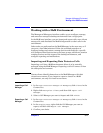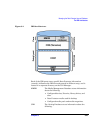
Managing the Data Protector Internal Database
About the Data Protector Internal Database
Chapter 9 383
About the Data Protector Internal Database
What Is the Data
Protector Internal
Database (IDB)?
The Data Protector internal database (IDB) is an embedded database,
located on the Cell Manager, which keeps information regarding what
data is backed up; on which media it resides; the result of backup,
restore, and media management sessions; and what devices and libraries
are configured.
Why Is the IDB
Used?
There are three key reasons for using the IDB:
• Fast and convenient restore
The information stored in the IDB enables you to browse the files and
directories to be restored. You can quickly find the media required for
a restore and therefore make the restore much faster.
• Backup management
The information stored in the IDB enables you to verify the result of
backup sessions.
• Media management
The information stored in the IDB enables you to allocate media
during backup, track media management operations and media
attributes, group media in different media pools, and track media
location in tape libraries.
How to Manage
the IDB
One of the important steps in setting up your Data Protector backup
environment is to configure the IDB. Once the IDB is configured as
described in “Configuring the IDB” on page 388, you will be notified if
you need to perform any of the IDB maintenance tasks.
The IDB maintenance tasks, and the cases when they need to be
performed, are described in “Maintaining the IDB” on page 402.
If you receive error messages, refer to “Troubleshooting the IDB” on
page 592 and “Recovering the IDB” on page 417.
For information on IDB limitations, refer to the HP OpenView Storage
Data Protector Software Release Notes.


















